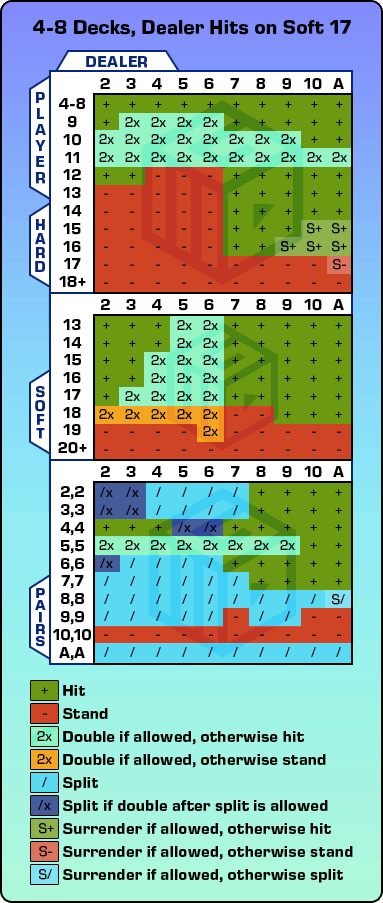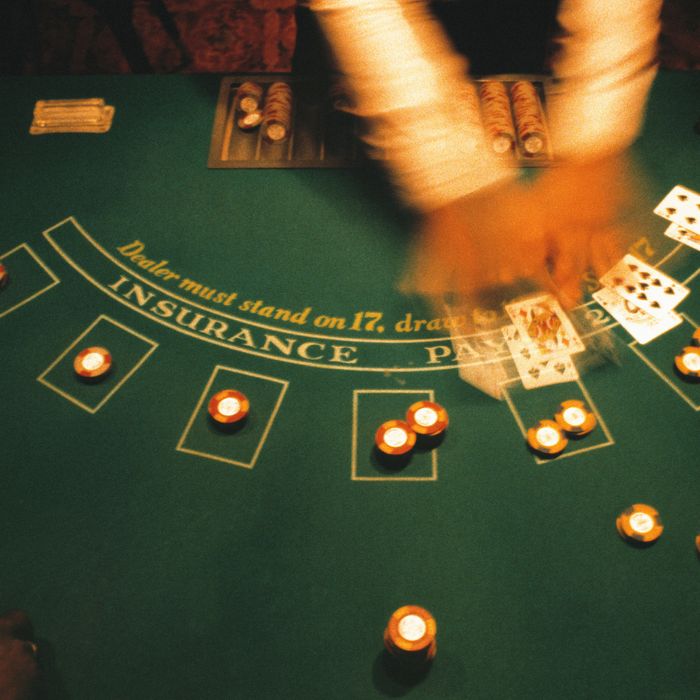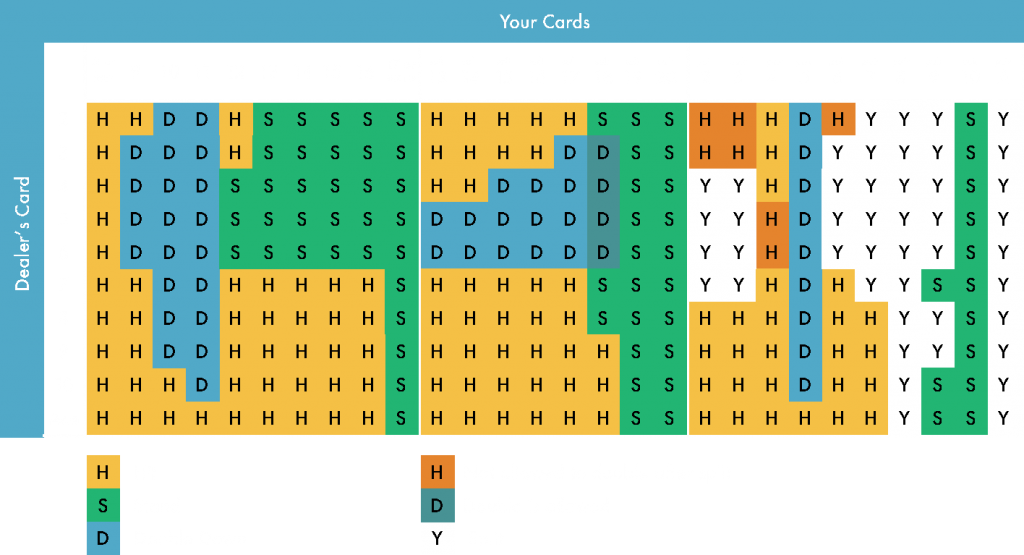In most casinos, the dealer is required to hit on hands worth less than 17 points, regardless of the cards that make up their hand. Hands worth 17 points, however, can’t be hit on. If you’re playing as the dealer and your hand is worth 17, 18, 19, 20 or 21 points, you can’t hit any further and need to stand with whatever hand you’ve got. Finally, learn whether the dealer checks for blackjack when they’re dealt an ace or a 10-value card – if they do check and the game continues, they don’t have blackjack. The pattern holds when the dealer has 8, 9 or Ace, too. Your average losses are lower when you hit rather than stand. Patterns are different when the dealer shows 2 through 6. Then those with soft 16 will want hit vs. 2 and 3 and double down vs. The tables assume the dealer already checked for, and did not have, blackjack. There are 16 total tables, for 1 to 8 decks and whether or not the dealer stands or hits on soft 17. For dealer probabilities before the dealer checks for blackjack please see Dealer Odds in Blackjack under European Rules. One Deck — Stand on Soft 17.
Blackjack is an extremely popular casino game, and one that offers lots of strategies and tips to help the player overcome the house edge; as much as possible anyway. Below, we've documented the Top 10 Blackjack Tips to help you improve your game.
Blackjack Tips #1: When To Hit
Use the following rules to determine when to Hit, according to your hand and the dealer's face up card.
-If the dealer's face up card is 7, 8, 9, 10 or Ace, and your hand totals 8 or 12 through 16, Hit.
-If the dealer's face up card is Ace, and your hand totals 11, do not Double, Hit.
-If the dealer's face up card is 10, and your hand totals 10, do not Double, Hit.
-If the dealer's face up card is 7, 8 or 9, and your hand totals 9, do not Double, Hit.
Blackjack Tips #2: When To Stand
Use the following rules to determine when to Stand, according to your hand and the dealer's face up card.
-When your hand totals 17 or above, no matter what, Stand. (Some strategies will tell you to hit 17 if the dealer has an Ace.)
-If the dealer's face up card is 6 or below, and your hand totals 13 or above, Stand.
-If you have a splitable pair of 10s or Face Cards, do not Split them, Stand.
Blackjack Tips #3: When To Split
Use the following rules to determine when to Split your hand, according to value of your pair and the dealer's face up card.
-Only Split 2s and 3s if the dealer's card is 4-7
-Never Split 5s; either Double Down, or Hit if the dealer is showing a 10 or Ace.
-Split 6s and 7s if the dealers card is 6 or below.
-Always split 8s, no matter what.
-Always Split Aces if allowed.
Blackjack Tips #4: When To Double
Doubling is a strategy often used when the player's hand equal 9, 10 or 11, giving the player a good chance of hitting 19-20 with a 10 or Face card. Use the following rules to determine when to Double your hand, according to your total and the dealer's face up card.
-Always double a total of 10 unless the dealer has 10 or Ace.
-Always double an 11 unless the dealer has an Ace.
-9 should only be doubled when the dealer has 3, 4, 5 or 6 showing.

Blackjack Tips #5: When in Doubt, Use a Strategy Chart

What Does A Blackjack Dealer Have To Hit On
Blackjack Strategy Charts are designed to tell a player exactly how to act in every possible situation. Some players do not like blackjack Strategy Charts because they remove the element of decision making, but consider this... Casinos get the upper hand because the dealer cannot make decisions. The dealer must follow strict rules based on probabilities when playing their hand. If the player uses the same strategy, he is effectively decreasing the house edge to a minimum.
Blackjack Tips #6: Game Selection, Know The Rules
There are many more variations of Blackjack than the classic version we all know and love. Each has a slight difference in the rules, and some even have optional side bets and progressive jackpots. When choosing to play a new variation of blackjack, such as Perfect Pairs, Super 21 or Progressive Blackjack, be sure to know all of the rules and payouts involved.

Blackjack Tips #7: Card Counting
Blackjack Card Counting is an age-old strategy used by many professional blackjack players. It is not that hard to learn, and can be very effective in minimizing losses and maximizing profits. It is recommended to get a good deal of practice in card counting before applying the strategy at a live casino so that the extensive security staff does not discover you are doing it. Card counting is not illegal by any means, but it may get you promptly, if not permanently, removed from the casino if caught. Note that card counting is not a viable online casino blackjack strategy. Online casino software re-shuffles the deck with each new hand.
Blackjack Tips #8: Play Online, It's Cheaper
Aside from the omission of card counting, playing online blackjack has many benefits. For one, you can put all of the money you intended to spend towards your bankroll. You won't have to gas up the car, purchase airline tickets or book a hotel (if no local casino). When you win, you won't have the obligatory 'tipping the dealer' to reduce your profits. All in all, it just makes sense to stay home, eat your own food, drink your own drinks and spend a lot less money by playing blackjack online.
Blackjack Tips #9: Play Online for Bonuses
Playing online isn't just about convenience. You can actually double or triple your bankroll when you sign up at an online casino. They all offer welcome bonuses, most matching your first deposit 100% to 200% or more, up to a certain amount. Instead of starting with $100 bankroll, made up of your own hard earned cash, why not play online and claim a welcome bonus that could give you're a lot more bankroll for your buck by way of free casino chips?
Blackjack Tips #10: Bet Sizes That Match Your Bankroll
Lastly, we'll go ahead state the obvious. Don't play a blackjack table where the limits do not correspond with your bankroll. If you have $200, don't sit at a blackjack table with a minimum $100 bet. No matter how many blackjack tips and strategies you apply, you'll want to have plenty of opportunities to play hands, with splitting and doubling available, in order to make a sizeable profit. Make sure you will be able to place a minimum of 40 bets with your bankroll before choosing a table.
Best Online Casinos
I like to assume that anyone reading one of my posts is starting at zero. I’m not doing exactly that here, because I’m not explaining in detail all the rules of casino blackjack.
But I do want to draw the distinction between hard hands and soft hands.
Blackjack is a simple comparing game where the player and dealer each start with a two-card hand. The one with the higher total points for their hand wins the bet, but only if they keep theirtotal to 21 or below. A total of 22 or higher is an automatic loss.
The cards have points based on their rank. The numbered cards have the same number of points as their numbers: 2, 3, 4, 5, 6, 7, 8, 9, and 10. The face cards (jack, queen, and king) are alsoworth 10 points each.
What Do Blackjack Dealers Have To Hit On The Road
The only exception is the ace. No one would blame you for thinking that an ace is worth 1 point. It is, in fact, in many situations, worth a single point.
But it’s also worth 11 points.
When you have a hand with no aces in it, you have a hard total. This means that the total is what the total is.
For example, if you have a jack and a 3, you have a hard total of 13. There’s no wiggle room there. That’s the total.
But if you have an ace and a 3, you have a soft total. That’s because the ace counts as 11, but if you get a card that would otherwise give you a total of 22, you can count it as a 1 instead.
With an ace and a 3, you have a soft 14. If you hit that hand and get a 10, you have a hard 14. (Any hand where the ace must be considered 1 point to avoid busting is also considered a hardhand.)
The strategy for a player with a soft hand as opposed to a hard hand is significantly different. Since you have that added layer of protection from busting, the right move is often to play a softtotal more aggressively.


But when we talk about a soft 17 “rule” in blackjack, we’re talking about how the dealer plays his hand.
